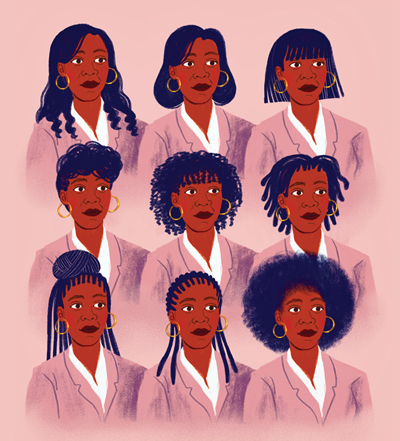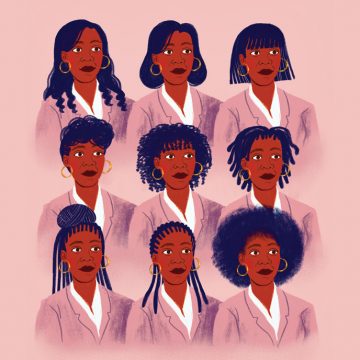In 2000, when I started my legal career at a large Bay Street firm, it would have been unthinkable for me to wear my hair in its naturally kinky state. How could I rock an Afro at the baby-associate welcome breakfast when everyone on the greeting committee looked like a Harvey Specter clone? I couldn’t. For me, the closest approximation was to wear my hair in a sleek, chemically straightened style, like Michelle Obama.
In the intervening years, the legal profession hasn’t changed all that much. Despite all of the talk about diversity, only eight percent of the racialized lawyers across Ontario are partners in private practice. The senior ranks of the profession remain shockingly homogenous.
In the broader culture, however, there has been a shift. Images of blackness now permeate mass media: in sports, movies, television and music. We are at a strange moment when so-called “black culture” is ubiquitous, even cool. Except in the hallowed halls of the law profession.
 Still, the shift in mainstream culture has been empowering. That change, in addition to getting older, gave me the confidence, about five years ago, to restore my natural hair. The elaborate process involved chopping my chemically treated hair to within an inch of my scalp and growing out the natural kink with the aid of various conditioning treatments and creams.
Still, the shift in mainstream culture has been empowering. That change, in addition to getting older, gave me the confidence, about five years ago, to restore my natural hair. The elaborate process involved chopping my chemically treated hair to within an inch of my scalp and growing out the natural kink with the aid of various conditioning treatments and creams.
I’m happy to report that I now wear my hair in its natural chemical-free state: a fully deployed afro with an eight-inch radius. Only on weekends, though. At work, my natural hair is tied back or I tame it down and wear a hairband. Even as a senior legal professional, I still worry that the “wrong” hairstyle at the office, like an afro, will be perceived as unprofessional, that I will pay a penalty.
I am not alone. A 2013 Deloitte survey found that, throughout the corporate world, 44 percent of employees “alter their self-presentation — including grooming, attire and mannerisms — to blend into the mainstream.” Many black women reported straightening their hair; some women also said that they wore more masculine clothing in order to better fit into their male-dominated fields.
Having to change core parts of your identity, including your hair, to fit “the norm” exacts an enormous emotional toll. It’s also bad for the bottom line. According to the Deloitte survey, employees who can’t be their true selves at work are less loyal to their employer.
It’s time to revisit the entrenched and antiquated notion of what a lawyer is supposed to look like. We still sanctify the hyper-conservative image of the trim-haired, Hugo Boss-clad straight white male. He can stick around, but let’s also make room for difference and originality. No longer can irrelevant factors like hair, race, nose rings, body fat, tats or vaginas be a barrier to entry and promotion.
And while we’re at it, let’s jettison the notion that we only hire lawyers who “fit” into our culture, which is just another way of saying “we don’t hire your kind.” Not only is this the moral thing to do, but it will also allow the profession to attract and retain the best talent. The more inclusive we are of non-prototypical lawyers, the closer we will get to a true meritocracy. We can and must do better.
 Sandra Rosier is a tax director at a Toronto-based investment company. Her enterprise focus is global capital markets and private-equity funds.
Sandra Rosier is a tax director at a Toronto-based investment company. Her enterprise focus is global capital markets and private-equity funds.
This story is from our Winter 2018 Issue.
Illustration by Salini Perera


